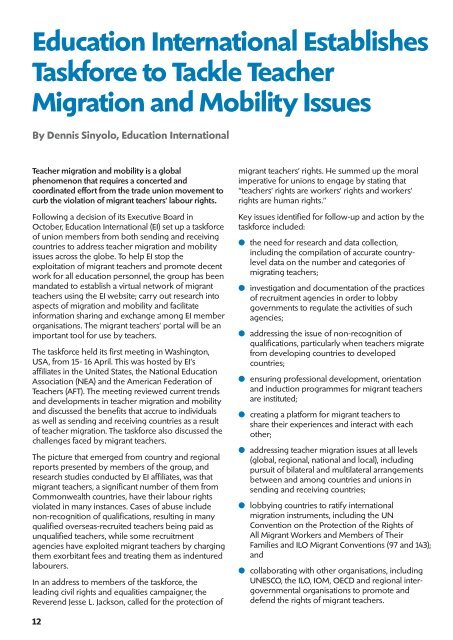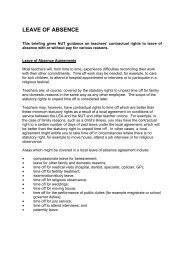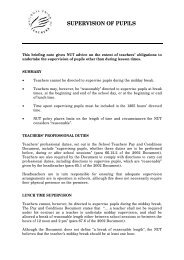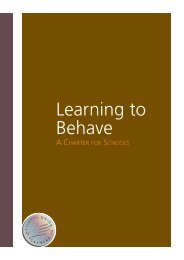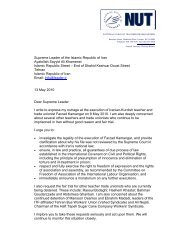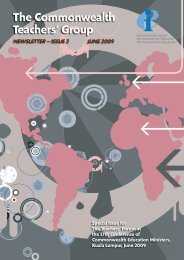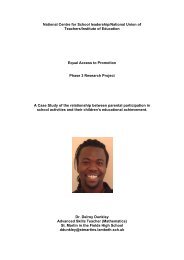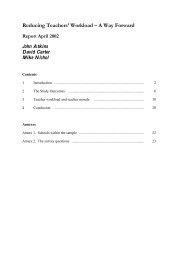The Commonwealth Teachers' Group NEWSLETTER
The Commonwealth Teachers' Group NEWSLETTER
The Commonwealth Teachers' Group NEWSLETTER
Create successful ePaper yourself
Turn your PDF publications into a flip-book with our unique Google optimized e-Paper software.
Education International Establishes<br />
Taskforce to Tackle Teacher<br />
Migration and Mobility Issues<br />
By Dennis Sinyolo, Education International<br />
Teacher migration and mobility is a global<br />
phenomenon that requires a concerted and<br />
coordinated effort from the trade union movement to<br />
curb the violation of migrant teachers’ labour rights.<br />
Following a decision of its Executive Board in<br />
October, Education International (EI) set up a taskforce<br />
of union members from both sending and receiving<br />
countries to address teacher migration and mobility<br />
issues across the globe. To help EI stop the<br />
exploitation of migrant teachers and promote decent<br />
work for all education personnel, the group has been<br />
mandated to establish a virtual network of migrant<br />
teachers using the EI website; carry out research into<br />
aspects of migration and mobility and facilitate<br />
information sharing and exchange among EI member<br />
organisations. <strong>The</strong> migrant teachers’ portal will be an<br />
important tool for use by teachers.<br />
<strong>The</strong> taskforce held its first meeting in Washington,<br />
USA, from 15- 16 April. This was hosted by EI’s<br />
affiliates in the United States, the National Education<br />
Association (NEA) and the American Federation of<br />
Teachers (AFT). <strong>The</strong> meeting reviewed current trends<br />
and developments in teacher migration and mobility<br />
and discussed the benefits that accrue to individuals<br />
as well as sending and receiving countries as a result<br />
of teacher migration. <strong>The</strong> taskforce also discussed the<br />
challenges faced by migrant teachers.<br />
<strong>The</strong> picture that emerged from country and regional<br />
reports presented by members of the group, and<br />
research studies conducted by EI affiliates, was that<br />
migrant teachers, a significant number of them from<br />
<strong>Commonwealth</strong> countries, have their labour rights<br />
violated in many instances. Cases of abuse include<br />
non-recognition of qualifications, resulting in many<br />
qualified overseas-recruited teachers being paid as<br />
unqualified teachers, while some recruitment<br />
agencies have exploited migrant teachers by charging<br />
them exorbitant fees and treating them as indentured<br />
labourers.<br />
In an address to members of the taskforce, the<br />
leading civil rights and equalities campaigner, the<br />
Reverend Jesse L. Jackson, called for the protection of<br />
migrant teachers’ rights. He summed up the moral<br />
imperative for unions to engage by stating that<br />
“teachers’ rights are workers’ rights and workers’<br />
rights are human rights.”<br />
Key issues identified for follow-up and action by the<br />
taskforce included:<br />
● the need for research and data collection,<br />
including the compilation of accurate countrylevel<br />
data on the number and categories of<br />
migrating teachers;<br />
● investigation and documentation of the practices<br />
of recruitment agencies in order to lobby<br />
governments to regulate the activities of such<br />
agencies;<br />
● addressing the issue of non-recognition of<br />
qualifications, particularly when teachers migrate<br />
from developing countries to developed<br />
countries;<br />
● ensuring professional development, orientation<br />
and induction programmes for migrant teachers<br />
are instituted;<br />
● creating a platform for migrant teachers to<br />
share their experiences and interact with each<br />
other;<br />
● addressing teacher migration issues at all levels<br />
(global, regional, national and local), including<br />
pursuit of bilateral and multilateral arrangements<br />
between and among countries and unions in<br />
sending and receiving countries;<br />
● lobbying countries to ratify international<br />
migration instruments, including the UN<br />
Convention on the Protection of the Rights of<br />
All Migrant Workers and Members of <strong>The</strong>ir<br />
Families and ILO Migrant Conventions (97 and 143);<br />
and<br />
● collaborating with other organisations, including<br />
UNESCO, the ILO, IOM, OECD and regional intergovernmental<br />
organisations to promote and<br />
defend the rights of migrant teachers.<br />
12


